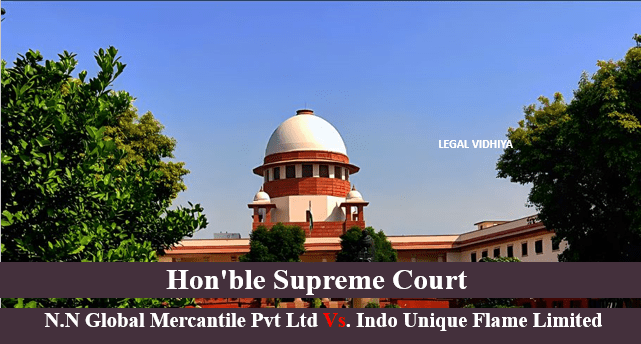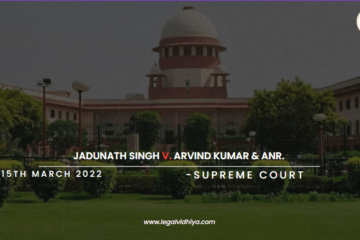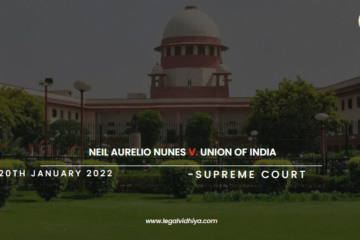
| Citation | CIVIL APPEAL NO(S). 3802-3803 |
| Date of Judgement | 25 April 2023 |
| Court | Supreme court |
| Case type | Arbitration agreement |
| Appellant | M/s. N.N. GLOBAL MERCANTILE PVT. LTD. |
| Respondent | M/s. INDO UNIQUE FLAME LTD. & OTHERS |
| Bench | |
| Referred | Sec 16(1)(a) of The Arbitration Act |
Facts
- The Karnataka Power Corporation Ltd. (KPCL) awarded a work order to Indo Unique (Indo Unique) for coal washing. After that, through Respondent 2 State Bank of India (SBI), Indo Unique provided a bank guarantee in accordance with the abovementioned work order in favour of KPCL.
- The Indo Unique afterwards entered into a subcontract for the transportation of coal with the appellant Company N.N. Global Mercantile (Global Mercantile).
- Global Mercantile was required to provide a security deposit under clause 9 of this subcontract. An arbitration agreement for resolving issues arising from the subcontract was incorporated in clause 10. As a result, Global Mercantile provided SBI with a bank guarantee.
- KPCL invoked the bank guarantee as a result of a few issues that occurred under the main contract. Additionally, Indo Unique used the bank guarantee that Global Mercantile provided as part of the subcontract.
- An appeal under Articles 226 and 227 of the Indian Constitution was filed before the Bombay High Court adhering to a series of proceedings that resulted from the Commercial Court in Nagpur’s decision to invoke the bank guarantee under the subcontract.
- The High Court disagreed with the Commercial Court’s conclusions and found in its ruling that the parties had a valid arbitration agreement, allowing the Section 8 application of the Arbitration and Conciliation Act, 1996 (the Act) to continue. The High Court proceeded by rejecting the claim that arbitration was not an appropriate venue for resolving the alleged fraudulent invocation of the bank guarantee.
- The High Court further ruled that the argument that the subcontract’s lack of stamp caused the arbitration agreement unenforceable might be brought up when submitting an application under Section 11 of the Act or at any other suitable time before the Arbitral Tribunal.
- Global Mercantile, dissatisfied with the Bombay High Court’s ruling, decided to use its constitutional right to file a special leave case with the Indian Supreme Court.
Issues
Three issues are brought up in the case:
I. Would an arbitration agreement remain valid even if the Work Order dated September 28, 2015 is unstamped and invalid under the Stamp Act?
II. Is the claim that the bank guarantee was fraudulently triggered an arbitrable dispute?
Arguments
Argument presented by the Appellant:
In a civil lawsuit against three respondents that the appellate counsel filed with the Commercial Court, it was claimed that Indo Unique had not assigned the task under a work order, that no payment had been made for it, and that no receipt had been provided. The bank guarantee, which is a conditional guarantee based on the completion of the job, has also been disclosed as not being included in the terms of the work order. The High Court agreed to a request from the appellant’s attorney to delay the implementation of its order for one month starting on September 30, 2020.
Argument presented by the Respondent:
Respondent counsel claims that they made the objection on the basis of the civil revision suit filed before the Bombay High Court contesting the decision of the commercial court.
Judgement
The Supreme Court acknowledged the significance of the theories of separability and kompetenz-kompetenz in modern and contemporary arbitral jurisprudence while heavily relying on them in its ruling. When underlining the necessity to give effect to the fundamental provisions of the 1985 UNICITRAL Model Law, which serves as the foundation for the Arbitration and Conciliation Act, the Supreme Court drew on the international arbitral jurisprudence of hotspots for international arbitration like the UK, US, and France. The Court also emphasized the purpose of the 2015 change to Section 11 of the Act, which was to reduce judicial interference in the arbitration process.
When the Court applied the law to the facts that had come up before it, it made notice of several of its prior rulings. In SMS Tea Estates (P) Ltd. v. Chandmari Tea Co. (P) Ltd. (SMS Tea), the court concluded, among other things, that an arbitration clause in an unstamped agreement cannot be enforced. A distinction between the two components of an unregistered and an unstamped agreement was made in the ruling. The Court concluded that the non-registration of an agreement would not alter the unenforceability of the arbitration agreement contained in it while succinctly applying the theory of separability to the feature of non-registration.
However, the Court determined that the severe and required requirements of the Stamp Act could not be read in a way that was consistent with the pertinent sections of the Arbitration and Conciliation Act when it came to the issue of unpaid stamp duty. The verdict in SMS Tea was handed down before to the 2016 Amendment to Section 11 of the Act, and the law in effect at that time was based on the Constitutional Bench’s ruling in SBP & Co. v. Patel Engg. Ltd.and should be noted here. & National Insurance Co. Ltd. v. Boghara Polyfab (P) Ltd. where certain threshold concerns could be reviewed by the Court at the pre-reference stage under Section 11(6) of the Act.
The Court ruled that the arbitration clause in the substantive business contract would not be deemed unenforceable or unlawful due to the non-payment of stamp duty. The relevant Stamp Act’s required clauses and the Court’s need to uphold arbitration agreements were reconciled in the Court’s reasoning. In order to make up for the inadequacy of the Court’s ratio in the Garware case, the Court heavily relied on the notion of separability. The Court observed out that a coordinate bench’s decision in Vidya Drolia v. Durga Trading Corpn. recently upheld the position in Garware. The Court referred this issue to be decided by a Constitutional Bench of 5 Judges after observing that it could not maintain the position established in Garware.as per incuriam. Additionally, the Court in Global Mercantile,established clear and uncomplicated rules for how the unstamped instrument should be handled at the time of arbitrator appointment. It’s interesting to note that the Court made a distinction between the goals of Sections 9 and 11, and it established that if an application for urgent ad interim relief was made under Section 9 of the Act, the Court would first have to grant ad interim relief to protect the arbitration’s subject matter before impounding the instrument until the necessary stamp duty was paid.
Regarding the second question, which concerned whether the claim of the fraudulent invocation of the bank guarantee was arbitrable, the Court cited a number of its own judgments and asserted that the former beliefs that courts had held fraud to be non-arbitrable were utterly antiquated and out of date. The Court disregarded these concerns, which were frequently based on the evaluation of copious evidence, a lack of experience on the part of the arbitrators, shortcomings of the arbitral regime, and erroneous concepts of domestic public policy, and declared fraud to be arbitrable.
Conclusion
The Indian arbitration community has been waiting impatiently for the Supreme Court of India’s decision in Global Mercantile. to take a particular stance. In rejecting the long-standing concerns of the Indian courts that led them to improperly intervene with arbitration procedures, the Supreme Court has taken a holistic, well-balanced, and modern approach. This decision has put an end to many protracted strategies that obstinate parties frequently employed to get out of honoring binding arbitration agreements.
Reference
- https://www.scconline.com/blog/post/2021/05/11/nn-global-mercantile-v-indo-unique-supreme-court-meets-the-international-benchmark/
- https://www.livelaw.in/pdf_upload/343-nn-global-mercantile-pvt-ltd-v-indo-unique-flame-ltd-25-apr-2023-471707.pdf
- https://indiankanoon.org/doc/39641512/
This article is written by Sushmita Singh of Lloyd School of Law, an intern under legal vidhiya.




0 Comments